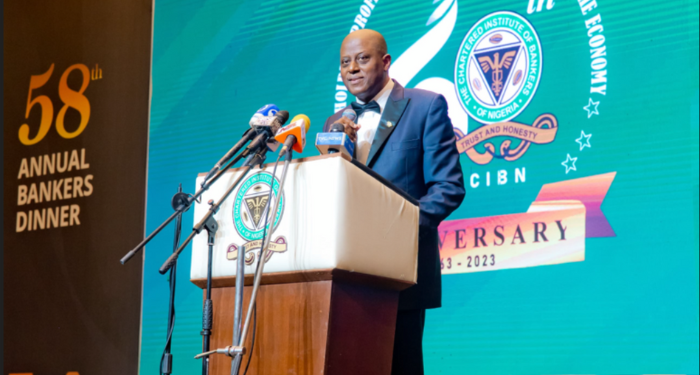The Central Bank of Nigeria (CBN) has announced significant reforms in the foreign exchange market, signaling a stride towards a market-driven exchange rate mechanism, potentially paving the way for a free float of the Naira.
This follows last week’s circular removing caps on international money transfer operations. The CBN’s recent circular outlines pivotal changes, including the discontinuation of a cap on the spread in interbank foreign exchange transactions and the lifting of restrictions on the sale of interbank proceeds.
- “A key objective of the ongoing foreign exchange market reforms by the Central Bank of Nigeria is to promote a market-based price discovery system,” the circular states, marking a shift towards a more liberalized forex regime.
- “Under the new guidelines, forex transactions will operate on a “Willing Buyer and Willing Seller” basis, ensuring more flexibility in the exchange rates determined by market forces. The CBN emphasizes the importance of transparency and ethical standards, mandating that “Authorized Dealers are to continue to conduct their foreign exchange transactions…and to strictly adhere to high ethical standards.”
Lifting Caps and Restrictions
The circular explicitly states the removal of any cap on the spread between buying and selling prices in the interbank foreign exchange market.
- This move is expected to enhance the liquidity and efficiency of the market by allowing more room for price negotiation.
- Furthermore, the lifting of restrictions on the sale of interbank proceeds is anticipated to increase the availability of foreign currency in the market.
Willing Buyer, Willing Seller Basis
The CBN has mandated that authorized dealers conduct their foreign exchange transactions on a “Willing Buyer and Willing Seller” basis.
- This directive aims to foster a more transparent, competitive, and efficient market, where exchange rates are determined by the market participants themselves, without fixed rates imposed by the regulator.
- In addition to promoting market-based pricing, the CBN’s circular stresses the importance of maintaining high ethical standards and transparency in foreign exchange dealings.
- Authorized dealers are expected to adopt appropriate price disclosures and ensure transparency in transactions, which is crucial for building confidence in the new system.
What this means
The move could be interpreted as a step closer to a free-floating Naira, where the currency’s value would be determined by supply and demand dynamics without direct intervention from the central bank.
While the circular does not explicitly announce a full transition to a free float, the reforms indicate a significant shift in policy direction.
Analysts view this development as a positive step towards aligning Nigeria’s foreign exchange market with global best practices. A market-driven exchange rate mechanism can enhance competitiveness, attract foreign investment, and potentially reduce the volatility associated with forex scarcity and speculation.
However, the transition to a fully free-floating currency requires careful monitoring and supportive fiscal policies to mitigate potential risks, such as excessive currency volatility and inflationary pressures. The success of these reforms will depend on the implementation fidelity and the overall economic policy framework of the Nigerian government.
Other implications
The implementation of the CBN’s foreign exchange market reforms, moving towards a more market-driven exchange rate system, necessitates complementary fiscal policy reforms to ensure the stability and growth of the Nigerian economy.
Specifically, reducing fiscal deficits and increasing government revenues are critical steps that need to be taken alongside these forex reforms. A reduction in fiscal deficits can help curb inflationary pressures by limiting the need for government borrowing, which often leads to an increase in money supply.
Increasing government revenues, through measures such as improving tax collection and diversifying the economy away from oil dependency, can provide the government with more resources to invest in critical infrastructure and social services without resorting to excessive borrowing.
In addition, the shift towards a market-driven exchange rate, as indicated by the CBN’s recent policy changes, has significant implications for inflation and the cost of imports in the short term.
- By allowing the Naira’s value to be determined by market forces, prices for imported goods, which are often indexed to the exchange rate, could experience volatility as the market adjusts to the new regime.
- This could lead to short-term inflationary pressures as the cost of imports rises, affecting consumers and businesses that rely on foreign goods and services.
- However, this policy also has the potential to restore foreign investor confidence and attract much-needed foreign investment into Nigeria.
- Additionally, by making imports more expensive, the policy could naturally curb excessive reliance on foreign goods, encouraging the development of local industries and reducing the trade deficit over the long term.





















While these steps may promote further discouragement on the reliance of foreign goods and services, is there anywhere that addresses settlement of these goods in naira rather than fx? Air travel is another sector I am concerned about because affordability will have a huge impact on citizens. There are still too many essential commodities that rely on fx and this with drive inflationary pressure and unless we start to focus more on catering for ourselves locally, the value of naira will never appreciate. Without Consumer spend, a meager % will be able to afford goods and services in dollars and will ultimately have an inverse impact on sttracting foreign investment
Thank you for this amazing article. I do however have a question. In the closing paragraph of the article, you mentioned reducing the trade deficit over the long term.
I’m not aware that Nigeria at present has a trade deficit according to the data released by the NBS. Could you please expatiate on that section/statement?
Thank you
That’s the problem when economists reel out idealistic text book policies as a panacea to our ailing economy. Even big industrial powerhouses like China still don’t fully subject their currency to market forces(because of its inherent dangers especially in Nigeria where corruption and bad leadership reign supreme). The CBN ought to know that this move will escalate the already high inflationary pressure. They have to look for ways to control the FX challenges on the short term while steps are taken on the long term to stop the haemorraging occuring in the economy which includes tackling high cost of governance and general growing impunity, restoring oil production to our traditional 2.2million barrels and ensuring that the full benefits of our solid minerals and gas potentials accrues to the country. This is not the time to follow World Bank and IMF prescriptions hook line and sinker. God bless Nigeria
I dare say that with the new fx policy, CBN is merely being academic about the Nigerian situation. If, by the analysis, fidelity is one of the necessary conditions required to make it work in favour of the majority of Nigerians, who guarantees its existence, or otherwise it’s deployment, in the deeply corrupted Nigerian market place.
Well written article. However, I disagree with last paragraph of the article quoted below:
‘Additionally, by making imports more expensive, the policy could naturally curb excessive reliance on foreign goods, encouraging the development of local industries and reducing the trade deficit over the long term’.
We have been hearing this line of reasoning since 1986 when Babangida started this auction of Naira/Dollar.
From that day 1 in September 1986, when 1 Dollar exchanged for about 3 Naira. Things have only gotten worse. It has not curbed the Nigerians appetite for imported products. Rather than developing local industries, industries, both local and multinationals are all shutting down and/or moving to other countries. This new policy, while it looks good on paper, with Nigeria having only crude oil as the major foreign exchange earner, I hate to say this, but, things will only get worse